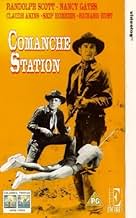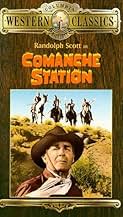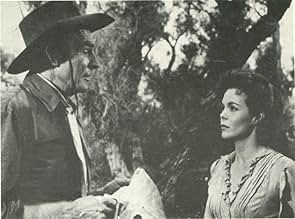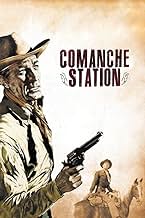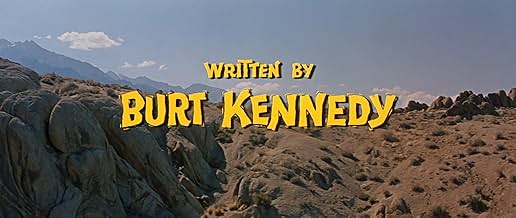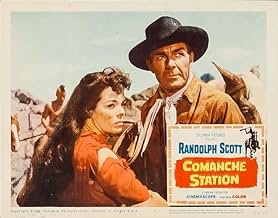CALIFICACIÓN DE IMDb
7.0/10
4.8 k
TU CALIFICACIÓN
Un hombre salva a una mujer que había sido secuestrada por los comanches, y luego lucha por llevar a ambos a casa con vida.Un hombre salva a una mujer que había sido secuestrada por los comanches, y luego lucha por llevar a ambos a casa con vida.Un hombre salva a una mujer que había sido secuestrada por los comanches, y luego lucha por llevar a ambos a casa con vida.
- Dirección
- Guionista
- Elenco
- Dirección
- Guionista
- Todo el elenco y el equipo
- Producción, taquilla y más en IMDbPro
Opiniones destacadas
Howard Hawks was once asked about his recipe for making a great film. His reply: "Three good scenes, no bad scenes". I would humbly add two other rules: A great film is one where no additional scene is needed, and no existing scene could have been cut. Few competent directors violate the first rule. The mark of a great director is the ability to follow the second. Many inferior directors are too shallow or too vain to understand this - they constantly strive to include superfluous or redundant scenes - Just To Make Sure You Got The Point - when it is wiser to let the audience decide what is important. John Ford was the master at this. Hawks, Wilder, Eastwood, also come to mind. With Commanche Station, Budd Boetticher showed that he knew how to distill a great story (with many elements of a Greek tragedy) to its most basic human elements - Obsession, Greed, Loyalty, Irony, and above all, Honor.
Not only did Boetticher direct a great film, Burt Kennedy (later to become a fair director himself) constructed a great script.
Some good scenes: A conversation between a woman who was taken captive by Commanches (and held for a time) and the stranger who has just paid her ransom... Nancy Lowe: If-if you had a woman taken by the Comanche and-and you got her back... how would you feel knowing? Jefferson Cody: If I loved her, it wouldn't matter. Nancy Lowe: Wouldn't it? Jefferson Cody: No ma'am, it wouldn't matter at all.
Or two friends, hired guns both, contemplating the need to commit a horrible crime for money: Frank: You want to go to work, do you? Dobie: Work? Frank: Making an honest living? Dobie: Oh, no, I don't think I could do that. I could cowboy some. Frank: Well, what will that get you? You work yourself to death for somebody and likely they will have to take up a collection to bury you.
Or a conversation between an honorable man and a young man trying to decide whether he will try to become one: Dobie: A saddle and a shirt, that's all Frank had. It sure ain't much. Jefferson Cody: Sure ain't. Dobie: It wasn't his fault, though. Jefferson Cody: No? Dobie: No, he never knew anything but the wild side. Jefferson Cody: A man can cross over anytime he has the mind.
As for the performances, they are uniformly good. Nancy Gates, Skip Homier, Richard Rust, and Claude Akins hit the right tone - never going too far for a laugh or a tear.
And Randolph Scott was perfect - A word I do not use lightly. Roger Ebert once said that Marlon Brando and Paul Newman started out on the same path: Both came on the scene in the early 1950s, both studied the Method, both looked good in an undershirt. But Brando went on to see what else he could throw in to his performances while Newman went on to see what he could leave out (Newman once said that he was dissatisfied with many of his early performances because "you could see the acting"). In Commanche Station, Randolph Scott provided the inspiration for such an approach. This is what makes a performance (indeed, a film) memorable - by distilling your performance to only that which is necessary, you allow the viewer to remember what is important to them, not what they are told should be important to them.
If I were held to only half a dozen westerns to be labeled as essential, this would be one of them (The others: My Darling Clementine (1946), Shane (1953), The Searchers (1956), The Man Who Shot Liberty Valance (1962) and Unforgiven (1992)).
Not only did Boetticher direct a great film, Burt Kennedy (later to become a fair director himself) constructed a great script.
Some good scenes: A conversation between a woman who was taken captive by Commanches (and held for a time) and the stranger who has just paid her ransom... Nancy Lowe: If-if you had a woman taken by the Comanche and-and you got her back... how would you feel knowing? Jefferson Cody: If I loved her, it wouldn't matter. Nancy Lowe: Wouldn't it? Jefferson Cody: No ma'am, it wouldn't matter at all.
Or two friends, hired guns both, contemplating the need to commit a horrible crime for money: Frank: You want to go to work, do you? Dobie: Work? Frank: Making an honest living? Dobie: Oh, no, I don't think I could do that. I could cowboy some. Frank: Well, what will that get you? You work yourself to death for somebody and likely they will have to take up a collection to bury you.
Or a conversation between an honorable man and a young man trying to decide whether he will try to become one: Dobie: A saddle and a shirt, that's all Frank had. It sure ain't much. Jefferson Cody: Sure ain't. Dobie: It wasn't his fault, though. Jefferson Cody: No? Dobie: No, he never knew anything but the wild side. Jefferson Cody: A man can cross over anytime he has the mind.
As for the performances, they are uniformly good. Nancy Gates, Skip Homier, Richard Rust, and Claude Akins hit the right tone - never going too far for a laugh or a tear.
And Randolph Scott was perfect - A word I do not use lightly. Roger Ebert once said that Marlon Brando and Paul Newman started out on the same path: Both came on the scene in the early 1950s, both studied the Method, both looked good in an undershirt. But Brando went on to see what else he could throw in to his performances while Newman went on to see what he could leave out (Newman once said that he was dissatisfied with many of his early performances because "you could see the acting"). In Commanche Station, Randolph Scott provided the inspiration for such an approach. This is what makes a performance (indeed, a film) memorable - by distilling your performance to only that which is necessary, you allow the viewer to remember what is important to them, not what they are told should be important to them.
If I were held to only half a dozen westerns to be labeled as essential, this would be one of them (The others: My Darling Clementine (1946), Shane (1953), The Searchers (1956), The Man Who Shot Liberty Valance (1962) and Unforgiven (1992)).
The last of the seven Scott/Boetticher collaborations and although it's not one of my favorites {THE TALL T (1957) and RIDE LONESOME (1959) come out ahead}, it's still worth owning on DVD if Columbia/Tristar ever sees fit to release it.
Randolph Scott plays a rancher named Jefferson Cody who's wife was kidnapped by the Comanches a few years before. When he hears that the Comanches are holding a white woman, he goes to them for a trade and winds up with another man's wife named Mrs. Lowe (Nancy Gates).
As they head back, they stop at Comanche Station in order to water their horses and get fresh supplies. When they arrive there, they see three men being chased by a bunch of Comanches on the warpath. Cody recognizes one of them as Ben Lane (Claude Akins), a soldier he had drummed out of the army for an atrocity against the Indians, many years before. He also suspects Lane is trafficking in scalps and that's why the Indians are after them.
They manage to fight them off and when the coast is clear, Lane informs Mrs. Lowe that she has a $5,000 reward put up for her by her husband. Mrs. Lowe then suspects Cody of his intentions but it's apparent from the beginning that Cody isn't interested in any reward money. He just wants to find out what happened to his wife.
Also Lane has a habit of saying "Ha-lo.." every time he's being addressed. A nice script touch put in there by Burt Kennedy who wrote the script. It gives Lane something to distinguish him by.
It now becomes a battle of wills between Cody and Lane with Mrs. Lowe and Lane's two dimwitted sidemen (played by Skip Homeier and Richard Rust) looking on. When Frank (Homeier) is sent up the creek to see if the Comanches have cut off their trail, he comes floating back down, dead with an arrow in his back. And later when Dobie (Rust) has a change of heart and wants to throw in with Cody, he gets shot in the back by Lane for his efforts.
That shot warns Cody that Lane is nearby and the inevitable showdown takes place in the Lone Pine rocks. We all know who wins that one, right? Cody finally brings Mrs. Lowe back to her husband only to learn that he is blind and really doesn't care what's happened to her. He just wants her back.
Beautiful widescreen print that was remastered in the late 1990s, this one would be a welcome addition to any western library. It needs a DVD release.
7 out of 10
Randolph Scott plays a rancher named Jefferson Cody who's wife was kidnapped by the Comanches a few years before. When he hears that the Comanches are holding a white woman, he goes to them for a trade and winds up with another man's wife named Mrs. Lowe (Nancy Gates).
As they head back, they stop at Comanche Station in order to water their horses and get fresh supplies. When they arrive there, they see three men being chased by a bunch of Comanches on the warpath. Cody recognizes one of them as Ben Lane (Claude Akins), a soldier he had drummed out of the army for an atrocity against the Indians, many years before. He also suspects Lane is trafficking in scalps and that's why the Indians are after them.
They manage to fight them off and when the coast is clear, Lane informs Mrs. Lowe that she has a $5,000 reward put up for her by her husband. Mrs. Lowe then suspects Cody of his intentions but it's apparent from the beginning that Cody isn't interested in any reward money. He just wants to find out what happened to his wife.
Also Lane has a habit of saying "Ha-lo.." every time he's being addressed. A nice script touch put in there by Burt Kennedy who wrote the script. It gives Lane something to distinguish him by.
It now becomes a battle of wills between Cody and Lane with Mrs. Lowe and Lane's two dimwitted sidemen (played by Skip Homeier and Richard Rust) looking on. When Frank (Homeier) is sent up the creek to see if the Comanches have cut off their trail, he comes floating back down, dead with an arrow in his back. And later when Dobie (Rust) has a change of heart and wants to throw in with Cody, he gets shot in the back by Lane for his efforts.
That shot warns Cody that Lane is nearby and the inevitable showdown takes place in the Lone Pine rocks. We all know who wins that one, right? Cody finally brings Mrs. Lowe back to her husband only to learn that he is blind and really doesn't care what's happened to her. He just wants her back.
Beautiful widescreen print that was remastered in the late 1990s, this one would be a welcome addition to any western library. It needs a DVD release.
7 out of 10
While the western genre is not my favourite one of all film genres (not sure which one is my favourite due to trying to appreciate them all the same), there is a lot of appreciation for it by me. There are a lot of very good to great films, with the best work of John Ford being notable examples.
'Comanche Station' is the final collaboration of the seven films director Budd Boetticher and lead actor Randolph Scott did together in the late 50s. By all means 'Comanche Station' is not their best pairing (perhaps towards the lesser end, which is not a knock as this merely means it's only because the best of them are so great), but one can totally see the appeal of their collaborations and both Boetticher and Scott are well served, the film being a good representation of both. It is a very good note to go out on and of their films it is perhaps the most overlooked. Which is a shame because it's a very good film with many excellent elements.
By all means not perfect. Nancy Gates is rather bland in a role that is rather underwritten. The film loses momentum on occasions.
However, Scott is as stoic and charismatic as ever with an appealingly craggy edge, being both likeable and tough. Every bit as good is a truly menacing Claude Akins, relishing his quite meaty villainous character. The two work very effectively together and their final confrontation is one of 'Comanche Station's' high points. Boetticher's direction is efficient and lean.
A big shout has to go to the production values. While there is grandeur and atmosphere to the settings it's the photography that's the star, especially in the unforgettable wordless opening sequence, one of my favourite openings of Boetticher's/Scott's films together. The music is rousing yet never intrusive and the more eventful parts blister.
There is thankfully no fat or ramble to the thought-probing, tight and sharply focused script and the storytelling is brutally bleak and movingly elegiac, mostly nicely paced too. 'Comanche Station' may not have the same depth of characterisation as other Boetticher/Scott outings or character complexity, but the two lead characters are interesting and the character interaction is a major plus point numerous times. Notably with Scott and Akins in their final confrontation, which positively blisters.
On the whole, very good. 8/10 Bethany Cox
'Comanche Station' is the final collaboration of the seven films director Budd Boetticher and lead actor Randolph Scott did together in the late 50s. By all means 'Comanche Station' is not their best pairing (perhaps towards the lesser end, which is not a knock as this merely means it's only because the best of them are so great), but one can totally see the appeal of their collaborations and both Boetticher and Scott are well served, the film being a good representation of both. It is a very good note to go out on and of their films it is perhaps the most overlooked. Which is a shame because it's a very good film with many excellent elements.
By all means not perfect. Nancy Gates is rather bland in a role that is rather underwritten. The film loses momentum on occasions.
However, Scott is as stoic and charismatic as ever with an appealingly craggy edge, being both likeable and tough. Every bit as good is a truly menacing Claude Akins, relishing his quite meaty villainous character. The two work very effectively together and their final confrontation is one of 'Comanche Station's' high points. Boetticher's direction is efficient and lean.
A big shout has to go to the production values. While there is grandeur and atmosphere to the settings it's the photography that's the star, especially in the unforgettable wordless opening sequence, one of my favourite openings of Boetticher's/Scott's films together. The music is rousing yet never intrusive and the more eventful parts blister.
There is thankfully no fat or ramble to the thought-probing, tight and sharply focused script and the storytelling is brutally bleak and movingly elegiac, mostly nicely paced too. 'Comanche Station' may not have the same depth of characterisation as other Boetticher/Scott outings or character complexity, but the two lead characters are interesting and the character interaction is a major plus point numerous times. Notably with Scott and Akins in their final confrontation, which positively blisters.
On the whole, very good. 8/10 Bethany Cox
Nice film regarded in certain Western lover circles as a cult classic. She was not the white woman he'd bought , but she was the white woman he was going go keep. She was worth 5000 dollars alive or dead but she was easier to bring in dead . Here Randolph Scott is the loner Jefferson Cole, an obsessive, stubborn man hunting the last ten years for his wife abducted by the Comanches, who rescues instead another kidnapped woman, she is a pretty heroíne, Nancy Gates: an attractive and no mean actress, only yo find himself up against three reward-hungry outlaws : the leader : Claude Akins , and his hoodlum sidekicks : Skip Homeier , Richard Rust, all of them insist on accompanying them back to the spouse homestead, saying they need additional protection. However, Cody soon realizes that this nasty trio are after the reward money and are scheming an ambush .Then Cole ferries the kidnapped woman back to civilisation throughout dangerous ways chased by the violent Comanches .
Tipically tough Randolph Scott western from his later years in films made by Budd Boetticher with whom he played a lot of Western in the Fifties and early Sixties. Magnificently and splendidly written by Burt Kennedy with roles doomed from the start . It results to be a bleakly pesimist movie that gains warmth from moving pursuits , Indian attacks , a discreetly elegiac tone and gently ironical humour .It deals with a simple, and plain plot , a hero achieves rescue a woman and they fall in with three villains , in the capable hands of a trío of awesome uglies , excellently played by Claude Akins , Skip Homeier and Richard Rust.
A Ranown production by Harry Joe Brown and Randolph Scott, delivered by Columbia Pictures , Budd Boetticher made it in medium budget and being finely starred by a solid cast as well as competent filmmaking . It contains a colorful and brilliant cinematography in Technicolor by Charles Lawton Jr, showing barren, stark outdoors and rocky landscapes. As well as atmospheric and thrilling musical score by Mischa Bakaleinikoff. The motion picture was compellingly directed by Budd Boetticher . His first Western was the low budgeted The Wolf Hunters 1949 produced by Monogram. With Universal International Pictures Budd made The Cimarron Kid , Bronco Buster, Horizons West , Seminole , The Man from Alamo. In 1956 he directed Seven Men From Now , a Batjac production , it began a long collaboration with Scott . Following Tall T in 1957 , produced by Harry Joe Brown and Boetticher , Decision at sundown 1957 , Buchanan Rides Alone 1958 , Ride lonesome 1959 , Westbound 1959. Most of them written by Burt Kennedy and Charles Lang Jr and cameramen William Clothier and Charles Lawton Jr . Finally, Boetticher wrote Two mules for the sister Sara by Don Siegel and his ending Western : Dying proud produced by Audie Murphy. Rating 7/10. Better than Average. Well Worth Watching .
Tipically tough Randolph Scott western from his later years in films made by Budd Boetticher with whom he played a lot of Western in the Fifties and early Sixties. Magnificently and splendidly written by Burt Kennedy with roles doomed from the start . It results to be a bleakly pesimist movie that gains warmth from moving pursuits , Indian attacks , a discreetly elegiac tone and gently ironical humour .It deals with a simple, and plain plot , a hero achieves rescue a woman and they fall in with three villains , in the capable hands of a trío of awesome uglies , excellently played by Claude Akins , Skip Homeier and Richard Rust.
A Ranown production by Harry Joe Brown and Randolph Scott, delivered by Columbia Pictures , Budd Boetticher made it in medium budget and being finely starred by a solid cast as well as competent filmmaking . It contains a colorful and brilliant cinematography in Technicolor by Charles Lawton Jr, showing barren, stark outdoors and rocky landscapes. As well as atmospheric and thrilling musical score by Mischa Bakaleinikoff. The motion picture was compellingly directed by Budd Boetticher . His first Western was the low budgeted The Wolf Hunters 1949 produced by Monogram. With Universal International Pictures Budd made The Cimarron Kid , Bronco Buster, Horizons West , Seminole , The Man from Alamo. In 1956 he directed Seven Men From Now , a Batjac production , it began a long collaboration with Scott . Following Tall T in 1957 , produced by Harry Joe Brown and Boetticher , Decision at sundown 1957 , Buchanan Rides Alone 1958 , Ride lonesome 1959 , Westbound 1959. Most of them written by Burt Kennedy and Charles Lang Jr and cameramen William Clothier and Charles Lawton Jr . Finally, Boetticher wrote Two mules for the sister Sara by Don Siegel and his ending Western : Dying proud produced by Audie Murphy. Rating 7/10. Better than Average. Well Worth Watching .
A magazine article recently cited this movie as an underrated western. I certainly agree. Randolph Scott made his best westerns in the latter part of his career, and this is one of those. The movie examines the old west moral code of right v. wrong and raps up with a surprising twist ending that gives cynicism a kick in the rear end. Not a big splashy western, but a solid little one.
¿Sabías que…?
- TriviaLast of the "Ranown Westerns", produced by Randolph Scott and his partner Harry Joe Brown under the Ranown Pictures banner. Scott decided to retire after this one, but two years later he was talked out of retirement by Sam Peckinpah for Pistoleros al atardecer (1962). After that film, Scott retired for good.
- ErroresDuring the final shootout with Claude Akins, Randolph Scott and Nancy Gates run and hide in a small rock cave in the hills. As they look out of the cave, a crew member in a blue shirt stands in the path in front of them. When Randolph Scott leaves the cave, he runs right past this crew member.
- ConexionesFeatured in The Guardian Interview with Budd Boetticher (1994)
Selecciones populares
Inicia sesión para calificar y agrega a la lista de videos para obtener recomendaciones personalizadas
- How long is Comanche Station?Con tecnología de Alexa
Detalles
- Fecha de lanzamiento
- País de origen
- Idiomas
- También se conoce como
- Comanche Station
- Locaciones de filmación
- Productora
- Ver más créditos de la compañía en IMDbPro
- Tiempo de ejecución1 hora 13 minutos
- Relación de aspecto
- 2.35 : 1
Contribuir a esta página
Sugiere una edición o agrega el contenido que falta

Principales brechas de datos
By what name was Estación comanche (1960) officially released in India in English?
Responda

